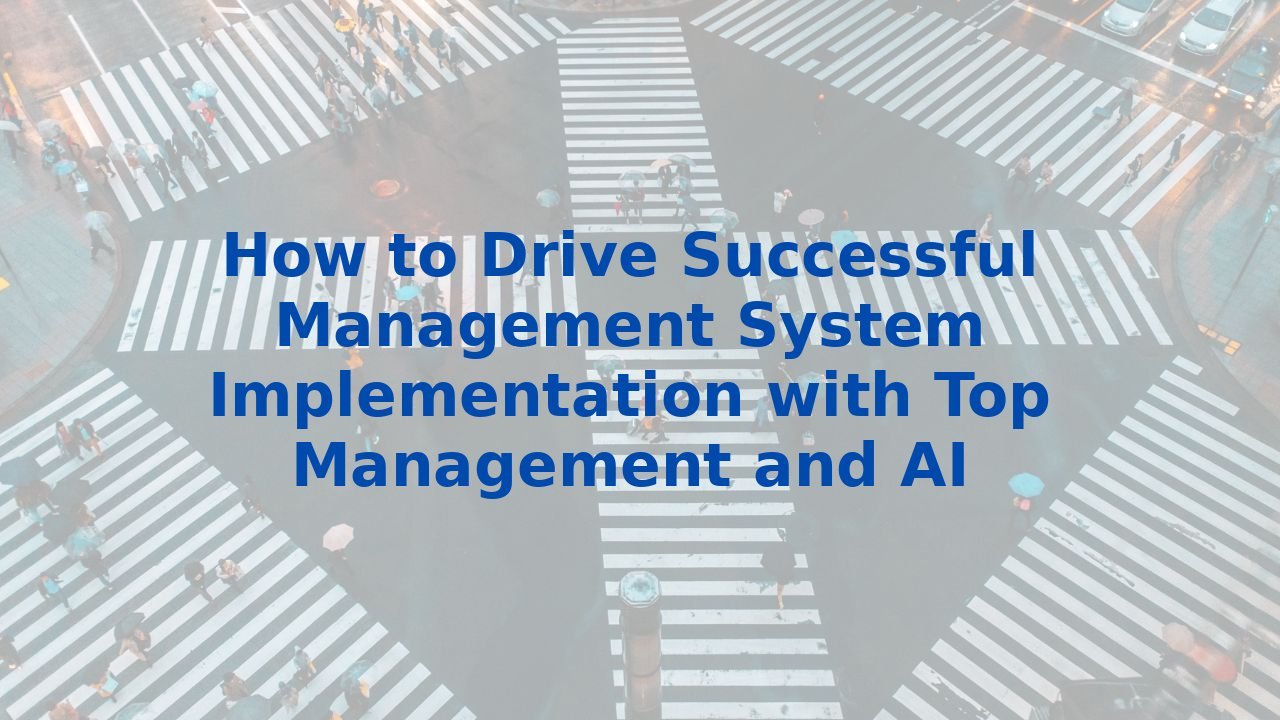How to Drive Successful Management System Implementation with Top Management and AI
Top Management’s Role in Implementing Management Systems
In today's fast-paced business environment, the successful implementation of management systems hinges on the commitment and leadership of top management. Their active involvement not only sets the tone for organizational culture but also aligns strategies, policies, processes, and resources toward sustainable objectives. But how can top management elevate this commitment to the next level? The answer lies in embracing innovative technologies such as Artificial Intelligence (AI).
The Value of Leadership and Commitment
Top management must actively participate in the development of management systems. This involves establishing a common purpose that resonates across all levels of the organization, ensuring that every employee is engaged and aligned with the company’s vision. With the rapid evolution of processes, AI can play a pivotal role in enhancing these efforts.
How AI Can Streamline Processes
One of the fundamental benefits of AI is its ability to increase efficiency and effectiveness across various business processes. Here are some key areas where AI can make a significant impact:
- Process Optimization: AI algorithms can analyze existing processes, identify bottlenecks, and recommend improvements, enabling organizations to work smarter and faster.
- Enhanced Communication: AI-driven tools facilitate seamless communication amongst departments, ensuring everyone is aligned with the organization's goals.
- Data-Driven Decision Making: AI's ability to process and evaluate vast amounts of data empowers management to make informed decisions rooted in evidence, enhancing strategic planning.
- Skill Development: AI systems can personalize training programs for employees, allowing individuals to develop competencies that align with organizational goals and customer expectations.
Benefits of Improved Coordination
AI enhances coordination and organization of processes, aligning them towards shared goals. By automating routine tasks, AI frees employees to focus on strategic activities that add value, creating a culture of productivity. The implementation of AI tools can help ensure that customer requirements are met effectively, fostering customer confidence and long-term success.
Management Principles for Success
The implementation of management systems is guided by several key management principles:
- Customer Focus: Meeting and exceeding customer requirements generates sustainable success.
- Leadership: Unified leadership underpins motivation and aligns the team with organizational objectives.
- People Commitment: Engaged employees at all levels drive value creation.
- Process Orientation: Effective process management leads to predictable and successful results.
- Continuous Improvement: Organizations must adapt and maintain performance levels by reacting nimbly to changes.
- Evidence-Based Decisions: Relying on data analytics ensures that management decisions lead to expected results.
- Relationship Management: Effectively nurturing relationships with stakeholders is vital for sustained success.
The Need for Active Management
Active management goes beyond merely delegating activities. It embodies a dynamic leadership that embraces learning and evolution, particularly in the realm of AI. By committing to ongoing training and development of both top management and employees, organizations create a robust platform for implementing advanced management systems that are adaptable and forward-thinking.
Investing in Employee Training for AI
As organizations adopt AI technologies, it becomes essential to invest in training employees. Programs tailored to instill AI-related skills not only increase employees’ competence but also empower them to harness AI in their respective roles. When the workforce is equipped with knowledge about AI, the entire organization benefits from improved efficiency, creativity, and job satisfaction. Moreover, organizations evolve into adaptive entities that can pivot in response to market changes.
Conclusion
A committed and involved top management serves as the linchpin for effective management system implementation. By embracing AI and equipping employees with the skills to utilize it, organizations can achieve unprecedented levels of efficiency and effectiveness. This commitment not only enhances internal processes but also fosters a culture of innovation and accountability that resonates throughout all levels of the organization. The future is not just about adopting new technologies; it’s about evolving leadership to navigate these changes successfully.
Remember, a dynamic management team that prioritizes continuous learning and growth is essential for sustaining success in a constantly evolving business landscape.



